Yanshu Li
Steering Vector Fields for Context-Aware Inference-Time Control in Large Language Models
Feb 02, 2026Abstract:Steering vectors (SVs) offer a lightweight way to control large language models (LLMs) at inference time by shifting hidden activations, providing a practical middle ground between prompting and fine-tuning. Yet SVs can be unreliable in practice. Some concepts are unsteerable, and even when steering helps on average it can backfire for a non-trivial fraction of inputs. Reliability also degrades in long-form generation and multi-attribute steering. We take a geometric view of these failures. A static SV applies the same update vector everywhere in representation space, implicitly assuming that the concept-improving direction is constant across contexts. When the locally effective direction varies with the current activation, a single global vector can become misaligned, which yields weak or reversed effects. Guided by this perspective, we propose Steering Vector Fields (SVF), which learns a differentiable concept scoring function whose local gradient defines the steering direction at each activation, making interventions explicitly context-dependent. This formulation supports coordinated multi-layer interventions in a shared, aligned concept space, and enables efficient long-form and multi-attribute control within a unified framework. Across multiple LLMs and steering tasks, SVF delivers stronger and more reliable control, improving the practicality of inference-time steering.
Evaluating Parameter Efficient Methods for RLVR
Dec 30, 2025Abstract:We systematically evaluate Parameter-Efficient Fine-Tuning (PEFT) methods under the paradigm of Reinforcement Learning with Verifiable Rewards (RLVR). RLVR incentivizes language models to enhance their reasoning capabilities through verifiable feedback; however, while methods like LoRA are commonly used, the optimal PEFT architecture for RLVR remains unidentified. In this work, we conduct the first comprehensive evaluation of over 12 PEFT methodologies across the DeepSeek-R1-Distill families on mathematical reasoning benchmarks. Our empirical results challenge the default adoption of standard LoRA with three main findings. First, we demonstrate that structural variants, such as DoRA, AdaLoRA, and MiSS, consistently outperform LoRA. Second, we uncover a spectral collapse phenomenon in SVD-informed initialization strategies (\textit{e.g.,} PiSSA, MiLoRA), attributing their failure to a fundamental misalignment between principal-component updates and RL optimization. Furthermore, our ablations reveal that extreme parameter reduction (\textit{e.g.,} VeRA, Rank-1) severely bottlenecks reasoning capacity. We further conduct ablation studies and scaling experiments to validate our findings. This work provides a definitive guide for advocating for more exploration for parameter-efficient RL methods.
Self-Supervised Visual Prompting for Cross-Domain Road Damage Detection
Nov 16, 2025
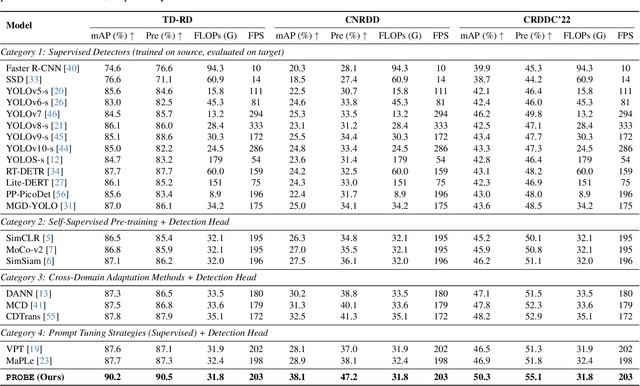
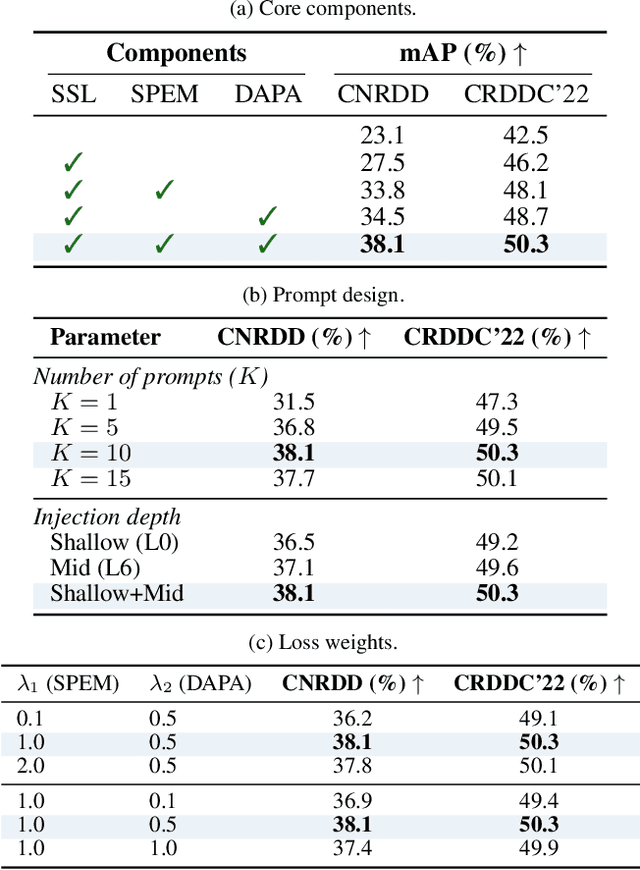

Abstract:The deployment of automated pavement defect detection is often hindered by poor cross-domain generalization. Supervised detectors achieve strong in-domain accuracy but require costly re-annotation for new environments, while standard self-supervised methods capture generic features and remain vulnerable to domain shift. We propose \ours, a self-supervised framework that \emph{visually probes} target domains without labels. \ours introduces a Self-supervised Prompt Enhancement Module (SPEM), which derives defect-aware prompts from unlabeled target data to guide a frozen ViT backbone, and a Domain-Aware Prompt Alignment (DAPA) objective, which aligns prompt-conditioned source and target representations. Experiments on four challenging benchmarks show that \ours consistently outperforms strong supervised, self-supervised, and adaptation baselines, achieving robust zero-shot transfer, improved resilience to domain variations, and high data efficiency in few-shot adaptation. These results highlight self-supervised prompting as a practical direction for building scalable and adaptive visual inspection systems. Source code is publicly available: https://github.com/xixiaouab/PROBE/tree/main
Read the Scene, Not the Script: Outcome-Aware Safety for LLMs
Oct 05, 2025Abstract:Safety-aligned Large Language Models (LLMs) still show two dominant failure modes: they are easily jailbroken, or they over-refuse harmless inputs that contain sensitive surface signals. We trace both to a common cause: current models reason weakly about links between actions and outcomes and over-rely on surface-form signals, lexical or stylistic cues that do not encode consequences. We define this failure mode as Consequence-blindness. To study consequence-blindness, we build a benchmark named CB-Bench covering four risk scenarios that vary whether semantic risk aligns with outcome risk, enabling evaluation under both matched and mismatched conditions which are often ignored by existing safety benchmarks. Mainstream models consistently fail to separate these risks and exhibit consequence-blindness, indicating that consequence-blindness is widespread and systematic. To mitigate consequence-blindness, we introduce CS-Chain-4k, a consequence-reasoning dataset for safety alignment. Models fine-tuned on CS-Chain-4k show clear gains against semantic-camouflage jailbreaks and reduce over-refusal on harmless inputs, while maintaining utility and generalization on other benchmarks. These results clarify the limits of current alignment, establish consequence-aware reasoning as a core alignment goal and provide a more practical and reproducible evaluation path.
CATP: Contextually Adaptive Token Pruning for Efficient and Enhanced Multimodal In-Context Learning
Aug 11, 2025Abstract:Modern large vision-language models (LVLMs) convert each input image into a large set of tokens, far outnumbering the text tokens. Although this improves visual perception, it introduces severe image token redundancy. Because image tokens carry sparse information, many add little to reasoning, yet greatly increase inference cost. The emerging image token pruning methods tackle this issue by identifying the most important tokens and discarding the rest. These methods can raise efficiency with only modest performance loss. However, most of them only consider single-image tasks and overlook multimodal in-context learning (ICL), where redundancy is greater and efficiency is more critical. Redundant tokens weaken the advantage of multimodal ICL for rapid domain adaptation and cause unstable performance. Applying existing pruning methods in this setting leads to large accuracy drops, exposing a clear gap and the need for new techniques. Thus, we propose Contextually Adaptive Token Pruning (CATP), a training-free pruning method targeted at multimodal ICL. CATP consists of two stages that perform progressive pruning to fully account for the complex cross-modal interactions in the input sequence. After removing 77.8\% of the image tokens, CATP produces an average performance gain of 0.6\% over the vanilla model on four LVLMs and eight benchmarks, exceeding all baselines remarkably. Meanwhile, it effectively improves efficiency by achieving an average reduction of 10.78\% in inference latency. CATP enhances the practical value of multimodal ICL and lays the groundwork for future progress in interleaved image-text scenarios.
Latent Chain-of-Thought? Decoding the Depth-Recurrent Transformer
Jul 02, 2025



Abstract:Chain-of-thought (CoT) reasoning has enabled transformer-based language models to excel at complex mathematics and multi-step planning. However, in standard decoder-only architectures, these reasoning steps are externalized in natural language, improving interpretability at the cost of efficiency. To capture reasoning that is not easily represented in words, many works have explored recurrent architectures that aim to internalize reasoning in latent space, potentially supporting latent CoT. In this paper, we investigate whether such reasoning structures emerge in Huginn-3.5B, a depth-recurrent Transformer that reuses layers at inference time without increasing parameter count. We examine the model's internal behavior on arithmetic tasks using a suite of probing techniques including the Logit Lens and Coda Lens. Our findings reveal limited evidence of interpretable latent CoT by tracking rank trajectories of final and intermediate result tokens. Furthermore, we uncover significant probing inconsistencies across recurrent blocks, where the interpretability of hidden states depends heavily on both the layer index and the decoding method. Finally, we empirically show that increasing recurrence depth yields only marginal gains and falls well short of models that explicitly externalize reasoning steps. The code is available at https://github.com/wenquanlu/huginn-latent-cot.
ViP$^2$-CLIP: Visual-Perception Prompting with Unified Alignment for Zero-Shot Anomaly Detection
May 23, 2025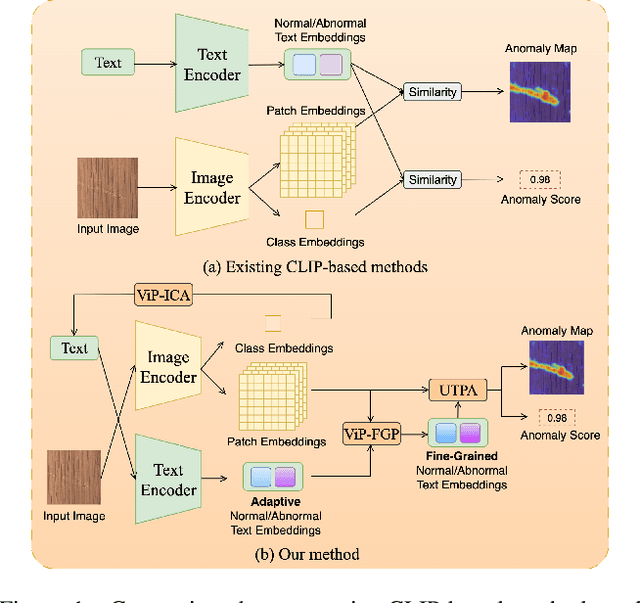

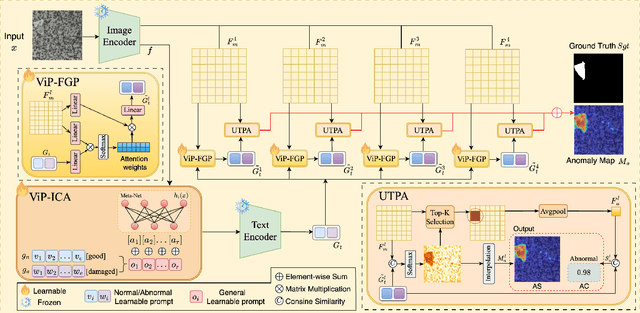

Abstract:Zero-shot anomaly detection (ZSAD) aims to detect anomalies without any target domain training samples, relying solely on external auxiliary data. Existing CLIP-based methods attempt to activate the model's ZSAD potential via handcrafted or static learnable prompts. The former incur high engineering costs and limited semantic coverage, whereas the latter apply identical descriptions across diverse anomaly types, thus fail to adapt to complex variations. Furthermore, since CLIP is originally pretrained on large-scale classification tasks, its anomaly segmentation quality is highly sensitive to the exact wording of class names, severely constraining prompting strategies that depend on class labels. To address these challenges, we introduce ViP$^{2}$-CLIP. The key insight of ViP$^{2}$-CLIP is a Visual-Perception Prompting (ViP-Prompt) mechanism, which fuses global and multi-scale local visual context to adaptively generate fine-grained textual prompts, eliminating manual templates and class-name priors. This design enables our model to focus on precise abnormal regions, making it particularly valuable when category labels are ambiguous or privacy-constrained. Extensive experiments on 15 industrial and medical benchmarks demonstrate that ViP$^{2}$-CLIP achieves state-of-the-art performance and robust cross-domain generalization.
CAMA: Enhancing Multimodal In-Context Learning with Context-Aware Modulated Attention
May 21, 2025Abstract:Multimodal in-context learning (ICL) enables large vision-language models (LVLMs) to efficiently adapt to novel tasks, supporting a wide array of real-world applications. However, multimodal ICL remains unstable, and current research largely focuses on optimizing sequence configuration while overlooking the internal mechanisms of LVLMs. In this work, we first provide a theoretical analysis of attentional dynamics in multimodal ICL and identify three core limitations of standard attention that ICL impair performance. To address these challenges, we propose Context-Aware Modulated Attention (CAMA), a simple yet effective plug-and-play method for directly calibrating LVLM attention logits. CAMA is training-free and can be seamlessly applied to various open-source LVLMs. We evaluate CAMA on four LVLMs across six benchmarks, demonstrating its effectiveness and generality. CAMA opens new opportunities for deeper exploration and targeted utilization of LVLM attention dynamics to advance multimodal reasoning.
TACO: Enhancing Multimodal In-context Learning via Task Mapping-Guided Sequence Configuration
May 21, 2025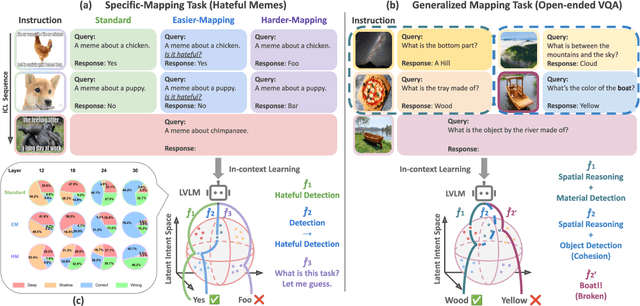

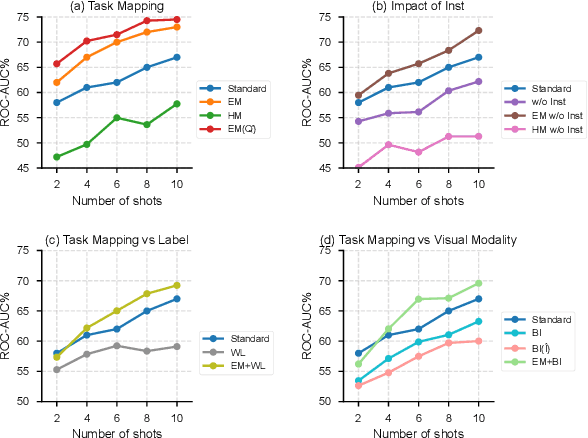

Abstract:Multimodal in-context learning (ICL) has emerged as a key mechanism for harnessing the capabilities of large vision-language models (LVLMs). However, its effectiveness remains highly sensitive to the quality of input in-context sequences, particularly for tasks involving complex reasoning or open-ended generation. A major limitation is our limited understanding of how LVLMs actually exploit these sequences during inference. To bridge this gap, we systematically interpret multimodal ICL through the lens of task mapping, which reveals how local and global relationships within and among demonstrations guide model reasoning. Building on this insight, we present TACO, a lightweight transformer-based model equipped with task-aware attention that dynamically configures in-context sequences. By injecting task-mapping signals into the autoregressive decoding process, TACO creates a bidirectional synergy between sequence construction and task reasoning. Experiments on five LVLMs and nine datasets demonstrate that TACO consistently surpasses baselines across diverse ICL tasks. These results position task mapping as a valuable perspective for interpreting and improving multimodal ICL.
Draw with Thought: Unleashing Multimodal Reasoning for Scientific Diagram Generation
Apr 13, 2025Abstract:Scientific diagrams are vital tools for communicating structured knowledge across disciplines. However, they are often published as static raster images, losing symbolic semantics and limiting reuse. While Multimodal Large Language Models (MLLMs) offer a pathway to bridging vision and structure, existing methods lack semantic control and structural interpretability, especially on complex diagrams. We propose Draw with Thought (DwT), a training-free framework that guides MLLMs to reconstruct diagrams into editable mxGraph XML code through cognitively-grounded Chain-of-Thought reasoning. DwT enables interpretable and controllable outputs without model fine-tuning by dividing the task into two stages: Coarse-to-Fine Planning, which handles perceptual structuring and semantic specification, and Structure-Aware Code Generation, enhanced by format-guided refinement. To support evaluation, we release Plot2XML, a benchmark of 247 real-world scientific diagrams with gold-standard XML annotations. Extensive experiments across eight MLLMs show that our approach yields high-fidelity, semantically aligned, and structurally valid reconstructions, with human evaluations confirming strong alignment in both accuracy and visual aesthetics, offering a scalable solution for converting static visuals into executable representations and advancing machine understanding of scientific graphics.
 Add to Chrome
Add to Chrome Add to Firefox
Add to Firefox Add to Edge
Add to Edge